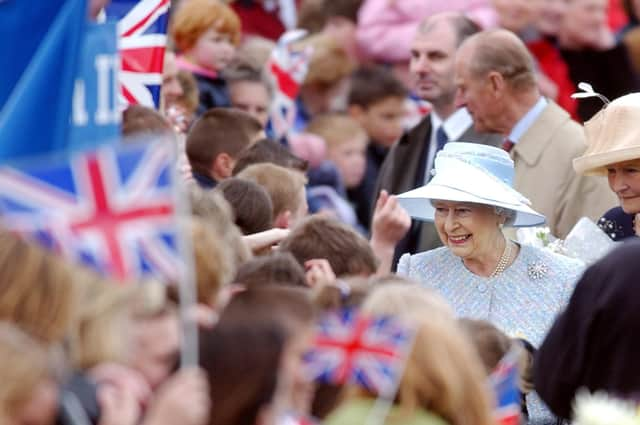Ruth Dudley Edwards: May all good people joyfully celebrate our trusted Queen


I am so not least because as this paper’s editor Ben Lowry put it — it’s been a “front-rank scandal” that this huge milestone has been given such a pathetic level of official recognition.
We know why, of course.
As Ben thundered, this was “a craven capitulation to a determined minority of the population who called this a failed statelet, people who will never see or recognise upsides”.
Advertisement
Hide AdAdvertisement
Hide AdWell, I’m good at recognising upsides, and from what I’ve seen and heard since then, this parade was a joyous celebration in music and colourful spectacle of a British identity that remains intact despite a hundred years of murder, intimidation and betrayal.
When I first began attending loyal orders parades I appreciated the fervour with which the national anthem was sung compared to apologetic renditions in London, where I live.
I am an immigrant to the United Kingdom, but I’ve always believed the monarchy plays a vital role in providing both a sense of continuity and facilitating positive change.
Yet I was nervous twenty years ago that her Golden Jubilee might be a flop.
Advertisement
Hide AdAdvertisement
Hide AdIn 1977, the year of her Silver Jubilee, as a civil servant in a tower overlooking the Thames I had hosted in my office a happy party to watch her Jubilee Night Royal Pageant, but in 2002, the republican-minded media were gleefully predicting a disaster.
The royal family was still getting a bad press over Diana’s death, the public was hostile to Camilla, whom Charles had not yet dared marry, and Prince Harry’s drug-taking had been all over the tabloids.
More importantly, New Labour thinking about the necessity to modernise everything whether it worked or not was in the ascendant.
The commentators who lived in a liberal bubble had been so thrilled by the elections of two female lawyers as president of the Irish Republic — Mary Robinson in 1990 and Mary MacAleese in 1997 — that their calls for an elected head of state had become increasingly noisy.
Advertisement
Hide AdAdvertisement
Hide AdMy simple view was and is that whatever Ireland, the land of my birth, wanted, was Ireland’s business, but that I had no desire to see in the country where I now lived the replacement by a retired politician or celebrity of a constitutional monarchy whose roots went back a thousand years and which knew how to adapt.
I stuck to my guns when dragged into arguments on panels, the media and socially by people who sneered at me for being old-fashioned and thinking tradition and history mattered.
I have great faith in the common sense of the British electorate, but I was a bit worried.
When Princess Margaret, the Queen’s only sibling died in February, coverage majored on her self-indulgence and her sad decline and when her mother’s death at 101 was announced at the end of March, pundits said it was ludicrous to have her lie in state for the weekend as no one would care.
Advertisement
Hide AdAdvertisement
Hide AdMagically, I was outside the Houses of Parliament when the Queen drove out after visiting the coffin in Westminster Hall, and heard a ripple of sympathetic applause break out, which, I learned later, would accompany her all the way back to Buckingham Palace.
I had been lucky enough to be taken to view the solemn and moving scene in the hall by a friend with a parliamentary pass. I doubt if I would have had the patience to queue along with the 200,000 who bewildered the press.
The UK-wide tour of the Queen and Prince Philip was hugely popular and viewing figures of the four-day Jubilee celebration topped 20 million at home and ten times as many abroad.
I wrote at the time in a Dublin newspaper: “Last week in Britain a 76-year-old grannie made patriotism and national pride respectable again, copperfastened the monarchy safe for another generation, did more for race relations than the equality industry could ever even dream of, saw off the republican movement, strengthened the Commonwealth, recaptured the union flag from right-wing fascists, made duty fashionable, put our government and her prime minister gently but firmly in their place and did wonders for tourism.”
Advertisement
Hide AdAdvertisement
Hide AdHer instructions for the Diamond Jubilee, at a time of austerity, was that the use of public funds should be minimised and people should not be forced to celebrate.
The weather was unkind, but spectacles like the 1,000 boats from around the Commonwealth forming the largest flotilla seen on the Thames in 350 years were uplifting and the love for her palpable.
And now, despite the death of her beloved husband, family problems and mobility difficulties, she leads us in a celebration of escape from isolation and shows her courage, goodwill, wisdom and warm heart, and the humility and dedication to her country, her faith and her family that has always sustained her.
Queen Elizabeth and her family are the British institution most trusted in Northern Ireland: they have shown their commitment to it over innumerable visits.
Advertisement
Hide AdAdvertisement
Hide AdMay all the good people join in joyfully celebrating a magnificent woman who has always lived up to her youthful vow to devote her life to our service.
It will have the side-benefit of annoying the begrudgers.